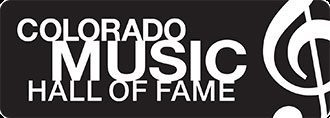The Astronauts
Circa 1962, the Astronauts played rock and roll and R&B hits of the day around the University of Colorado campus. RCA Victor wanted a surf group of its own to compete with the Beach Boys.
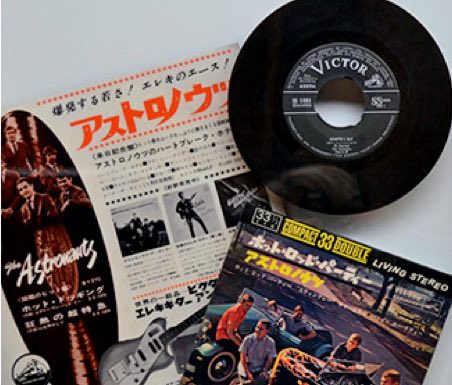

The Astronauts were the first Boulder band to make the national charts.
“Baja” became the group’s signature song in late summer 1963, occupying No. 94 on the Billboard Hot 100 and beginning a string of hits on Denver’s KIMN radio. The single, a surf instrumental, was taken from Surfin’ With the Astronauts, the first of eight albums. The Astronauts returned to their frat-rock roots for two live albums — one recorded at their own Club Baja in Denver and the other at Tulagi in Boulder.
The band also appeared on television’s Hullabaloo several times and had cameos in several teen movies.
Ironically, the Astronauts enjoyed their greatest success in Japan, outselling the rival Beach Boys. Five albums and three singles made the Japanese Top 10; “Movin’,” titled “Over the Sun” for the Japanese market, hit No. 1. In America, like hundreds of bands, the Astronauts—named in honor of Boulderite Scott Carpenter, one of NASA’s first spacemen—achieved a sort of working prosperity, constantly touring a mind-numbing blur of regional colleges, gyms and bars. In 1967, the draft struck, and Gallagher and Lindsey both wound up serving in Vietnam, essentially finishing the band.
Flash Cadillac
Flash Cadillac & the Continental Kids formed at the University of Colorado in 1968 as an oldies alternative to the rock sound. Lewd and rude shows at Tulagi quickly became the biggest events in Boulder. One year later, the band drove to Los Angeles to play the legendary Troubadour. Flash Cadillac came on last to a half-empty club and soon had the place packed with patrons dancing on the tables.
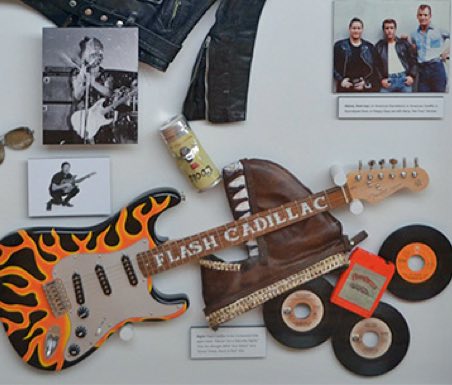

Flash Cadillac gained instant popularity within the music industry.
The band earned acclaim in the movies, appearing as the sock-hop band in George Lucas’s American Graffiti and in a scene in Francis Ford Coppola’s Vietnam epic, Apocalypse Now. The group also worked on television’s Happy Days and American Bandstand. “Dancin’ (on a Saturday Night),” recorded for Epic Records, cracked the Billboard Pop Singles charts at #93. Flash Cadillac gave the big time one more shot on Private Stock Records, gaining hits with “Did You Boogie (With Your Baby)” and “Good Times, Rock & Roll.”
By the mid-1970s, the band had purchased a little ranch near Woodland Park and built up the facility into a 24-track studio.
In 1992, Flash Cadillac—McFadin, Kris “Angelo” Moe (keyboards), Linn “Spike” Phillips III (guitar), Warren “Butch” Knight (bass), Dwight “Spider” Bement (sax) and the latest in a long line of drummers—was reborn, performing pops concerts with symphony orchestras across the country. Over the ensuing years, however, Flash Cadillac lost cylinders with the passing of Phillips, McFadin and Moe.
KIMN Radio
In Denver, the generation that grew up in the 1950s and 1960s had its worldview formed by KIMN, located at 950 on the AM radio dial. Under the ownership of Ken Palmer, the station became the dominant Top 40 music station in town. Newspapers reported that anywhere a crowd was gathered waiting for the Beatles to play Red Rocks on August 26, 1964, all of the transistor radios were tuned to KIMN.
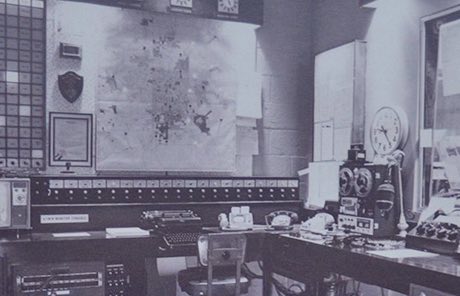
During this era of more innocent shock radio, KIMN’s popular record spinners were kings. Leading the pack was Pogo Poge, who would do almost anything to get people to listen to KIMN radio.
He got his name after hopping from Denver to Boulder on a pogo stick. He sat atop a flagpole for days and once played the Kingston Trio’s “Tom Dooley” for 18 hours straight. The most famous stunt he masterminded put him in the hospital: He spent nearly two weeks in a snake pit with more than 100 snakes and was bitten by a water moccasin.
Jay Mack was notorious for his cast of crazy characters, including Betty Jo with Niles and Farley. Hal “Baby” Moore was consistently voted Denver’s top disc jockey in the Harmony Record Shop poll.
The station highlighted popular local rock-and-roll bands and sponsored concerts with national stars mixed with local acts, giving them their biggest crowds ever. The news department featured “Sky Spy” Don Martin, who flew above Denver’s rush-hour skies when Interstate 25 extended only from Broadway to the notorious Mousetrap, which he named. Contests included jocks broadcasting live—in bed—from a dream house in Denver’s new Broomfield Heights suburb. The house went to the listener who guessed most closely the number of continuous hours the jocks could broadcast without sleep.
Sugar Loaf
The end of the 1960s set the stage for Sugarloaf, as the cream of several Denver bands came together as Chocolate Hair. Keyboardist/vocalist Jerry Corbetta and guitarist Bob Webber of the Moonrakers (Denver’s most popular group during the middle of the decade), plus Bob Raymond on bass and Myron Pollock on drums, recorded demos that got Chocolate Hair signed to Liberty Records.
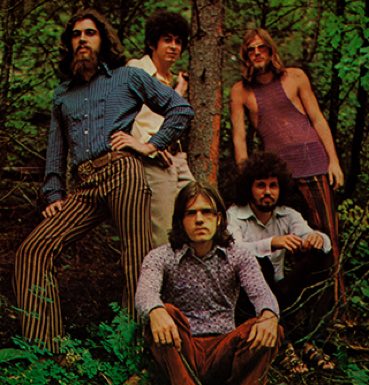

Prior to the release of “Green-Eyed Lady,” there had also been a name change. Told by the legal department at Liberty that Chocolate Hair had racial overtones, the band took the name of a mountain summit in the foothills above Boulder where Webber lived, transforming the rock quartet into Sugarloaf. Nonstop touring gave the band little time for songwriting, so they invited Robert Yeazel from the Colorado band Beast to join on guitar and vocals. An edit of his “Tongue in Cheek,” a track on the second Sugarloaf album, Spaceship Earth, became a minor hit in 1971.
In trying to regain a recording deal, Corbetta was spurned imperiously, which resulted in “Don’t Call Us, We’ll Call You.”
An amusing song about the fickle music industry, the dance-friendly new track spelled out the CBS Records phone number and a general White House number—touch-tone style—for the world. Recorded with initial drummer Pollock back in the fold, “Don’t Call Us, We’ll Call You,” by Jerry Corbetta/Sugarloaf, became a hit, reaching No. 9 in March 1975.
Do you love and appreciate the history of music? Head over to the Colorado Music Hall of Fame, where you get to learn and enjoy the rich history of music in Colorado.
